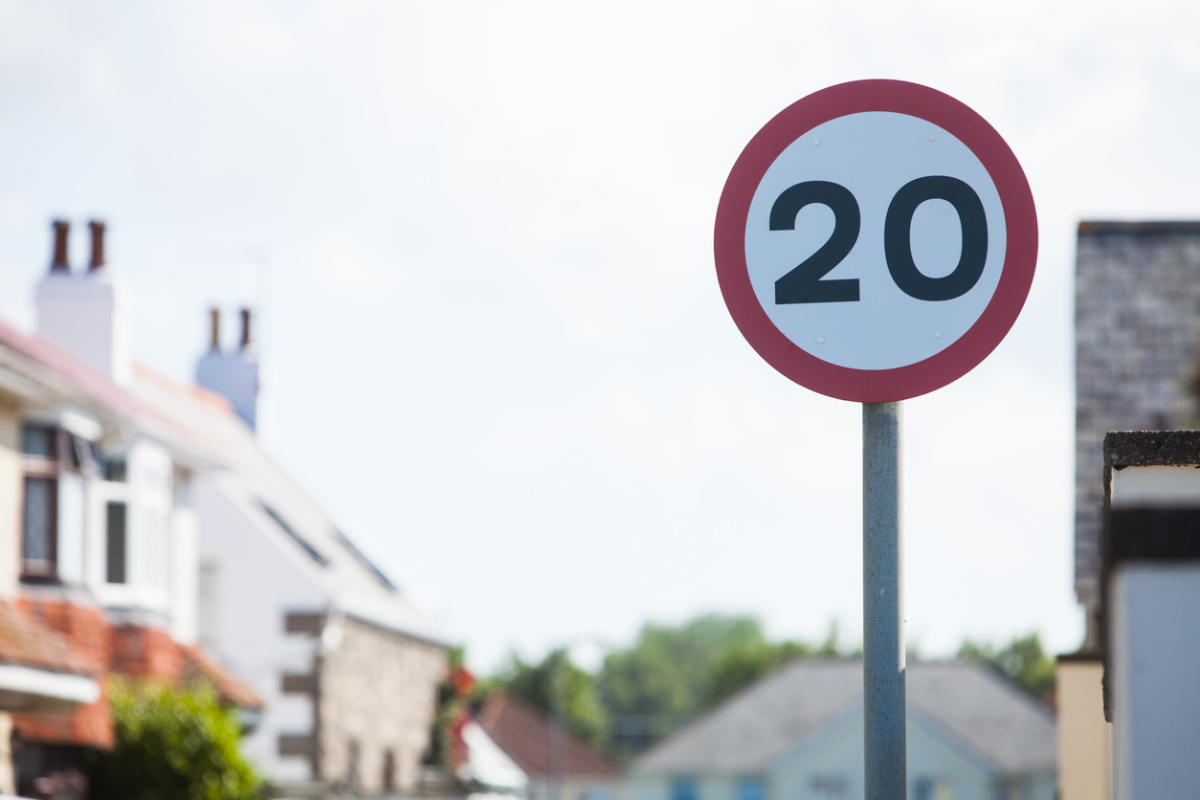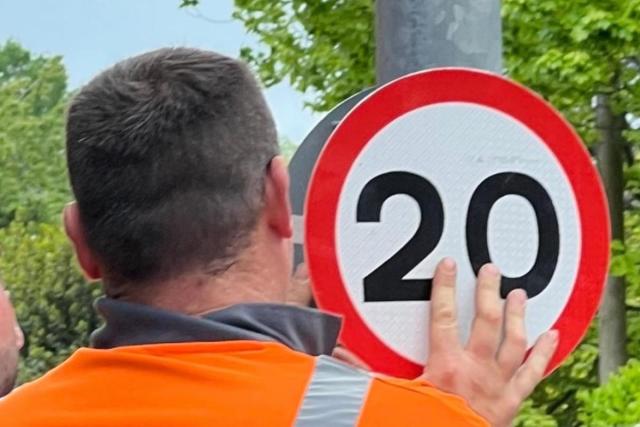News
Wales’ 20mph speed limit now in force amid much controversy

FROM Today (Sunday, Sept 17), the vast majority of residential roads across Wales will see a new speed limit of 20mph, a decision that has sparked extensive debate.
The Labour-led Welsh government has championed this initiative, suggesting that this would lead to a significant reduction in road accidents, saving both lives and NHS resources. They also believe such a move will make communities more pleasant to inhabit and work.
However, the decision has its critics. The Conservative party warns that the new limit could adversely impact the Welsh economy to the tune of billions. Natasha Asghar, the Welsh shadow transport minister, has branded the rollout as “madcap” and “ludicrous”, sentiments echoed by Penny Mordaunt, the leader of the House of Commons.
The RAC has issued a warning to drivers to be extra vigilant, especially this Sunday. Simon Williams, the motoring group’s head of policy, has highlighted potential pitfalls in satnav systems which may not reflect the recent updates.
Welsh Labour’s commitment to this policy can be traced back to their manifesto during the 2021 Senedd election. Despite the popularity of the party during the elections, a recent petition opposing the 20mph limit has amassed 70,000 signatures. There have also been incidents of newly erected 20mph signs being vandalised throughout the region.
Welsh First Minister, Mark Drakeford, acknowledges the controversy, stating that there will be a “period of turbulence” post-implementation. However, he remains confident that the public will eventually see the value and logic behind the policy.

What’s Driving the Change? Globally, evidence suggests that lowering speed limits can result in a significant reduction in collisions. The Welsh government projects a potential decrease of 40% in collisions, saving up to 10 lives and preventing up to 2,000 injuries annually. The transition aims to encourage walking and cycling, which would in turn, reduce car pollution.
Which Areas are Affected? Primarily, roads that currently have a 30mph limit will see the change to 20mph. However, local authorities retain the discretion to keep certain roads at the current speed limit.
The Economic Debate While opponents cite a staggering £4.5bn potential economic loss from the scheme, this figure, sourced from a Welsh government report, spans over 30 years. The Welsh government emphasises that the cost of rolling out the 20mph limit is £32m, which could be swiftly offset by saving the NHS an estimated £92m annually.
Trials and Reactions Eight trial areas saw varied responses. In St Brides Major, south Wales, the results seem positive. Yet, in Buckley, north Wales, there has been substantial opposition.
Enforcement Measures The police will primarily enforce the new speed limit. Interestingly, there will also be involvement from the firefighters’ road safety team, though this decision hasn’t been without its criticisms.
A Global Trend? Spain saw the introduction of a similar limit in 2021, which led to a 13% decrease in pedestrian deaths in specific areas. Despite some opposition in the UK, many British cities have adopted 20mph zones. Notably, Portsmouth, represented by Penny Mordaunt, was among the pioneers of this movement.
For now, the eyes of the UK will be on Wales, watching the outcomes and possible ripple effects of this decisive move.
LIVING STREETS CYMRU
Living Streets Cymru, part of the UK charity for everyday walking, is celebrating new legislation to reduce speed limits in Wales.
From today (17 September 2023), Wales will become the first UK nation to adopt a 20mph default speed limit on residential streets.
The new legislation means that most roads that currently operate as 30mph areas will reduce to 20mph. It is estimated that the move will save 6-10 lives every year, result in 40% fewer collisions and prevent up to 2,000 people being injured.
Research shows that setting the default speed limit at 20mph in residential roads in Wales will reduce pressure on the NHS from a reduction in injuries from road traffic collisions and save £92m each year.
In 2019, Spain reduced the speed limit to 30km/h (18.64mph) on the majority of its roads. Since then, there have been 20% fewer urban road deaths, with fatalities reduced by 34% for cyclists and 24% for pedestrians.
Stephen Edwards, Chief Executive, Living Streets said: “Introducing 20mph as the default speed on our residential streets will improve the places where we live, work and go to school.
“When someone is hit at 30mph, they are around five times more likely to be killed than if they were hit at 20mph. This is, quite literally, life-changing legislation.
“We will continue to work with Welsh Government to ensure that our streets and pavements are safe and accessible for everyone in our communities.”
Reducing speed limits will make it safer for more people in Wales to walk and cycle for short journeys, and as a result, reduce car use, congestion and air pollution.
In a recent survey, one in three Welsh adults said that 20mph speed limits would increase their likelihood of walking more often.
Data from WOW – the walk to school challenge from Living Streets – reported that schools in pilot 20mph areas have seen a 39% increase in active travel journeys (25 versus 18 percentage point increase) compared to schools predominantly in 30mph areas. Children also reported feeling much safer on their journey to and from school each day.
Living Streets Cymru is a member organisation of the 20mph Welsh Government Task Force Group, which provided evidence to support the 20mph restriction. In 1934, Living Streets (then called the Pedestrians Association) successfully advocated for the introduction of the 30mph limit.
SUSTRANS CYMRU
Sustrans Cymru said it welcomes the new legislation from Welsh Government that will make 20mph the default speed limit on restricted roads.
Speaking on the importance and impact of the landmark change, Christine Boston, Director of Sustrans Cymru, said: “Today, Wales takes a huge step forward as a country that prioritises the safety and quality of life of its people.
“By introducing 20mph as the new default speed limit on restricted roads, Wales’ streets will be safer and healthier places.
“This is the biggest safety change of a generation.
“The strongest and most obvious case for the 20mph default speed limit, simply, is that it will save lives.
“To disagree or disregard that is to accept death and injury as a standard – we want better for the people of Wales, which is why Sustrans wholly supports 20mph default speed limits.
“Lower speeds reduce the number of collisions due to shorter stopping distances and lessen the severity of injuries where collisions take place.
“Putting safety to one side, though, we strongly believe that 20mph default limits will foster stronger communities through calmer, safer, and friendlier streets.
“There will be fewer communities in Wales severed by fast roads, fewer streets where parents fear for their children to play, and fewer people put off from getting to essential local services.
“People in Wales have always had a strong sense of community and solidarity.
“We believe this will only be strengthened with less pollution and less danger on the roads in our communities across Wales.
“We believe 20mph will encourage all those things we know to be good.
“This is why we campaign for active travel, this is why we campaign for happier and healthier places to live, and this is why we support default 20mph speed limits on restricted roads.”
Natasha Asghar MS
Commenting on the Labour Government’s blanket 20mph speed limit being introduced, Welsh Conservative Shadow Transport Minister, Natasha Asghar MS said: “The Labour Government’s blanket 20mph speed limit coming into force today will cost the Welsh economy up to £8.9 billion, slow down our emergency services, and negatively impact people’s livelihoods.
“Sadly, with the Labour Deputy Minister refusing to rule out further speed limit changes, along with the Labour Government’s road building ban and the introduction of road charging, Labour continue to wage their anti-worker, anti-road and anti-motorist agenda.
“Only the Welsh Conservatives are standing up for our motorists and focusing on the people’s priorities.”
THE VIEW OF THE WELSH GOVERNMENT

The Welsh Government recently released a Press Release stating the following: “We recently became the first UK nation to pass legislation to lower the default national speed limit on residential roads and busy pedestrian streets from 30mph to 20mph when the Senedd voted in favour in July this year. Work is now underway to get Wales ready for that change, as limits will begin to change from September next year.
Here are seven things you may not know about the new 20mph default speed limit:
- Will it improve safety?
Yes, and the evidence is clear. Decreasing speed limits reduces collisions and saves lives. Previous research has shown that there are 40% fewer collisions in areas with 20mph compared with 30mph. In Wales, it has been estimated that with widespread introduction of 20mph, somewhere between 6 to 10 lives would be saved and between 1200 and 2000 casualties avoided each year. The value of preventing these casualties is between £58m and £94m each year.
As well as making collisions less severe when they do happen, the slower speed also increases the chances of avoiding a collision in the first place and reducing the burden on the NHS. Prevention is better than cure!
2. Will it improve the environment and help create safer communities?
Whatever car you have, getting to 30mph requires more than twice as much energy as getting to 20mph. In fact, evidence suggests that as a result of smoother driving styles, reducing braking and acceleration, improved traffic flow, and possible reductions in fuel consumption, 20mph produces less air pollution than 30mph.
People surveyed say that traffic speed is a barrier to walking and cycling for short journeys, so by lowering the speed limit, we’re helping to create safer, quieter, and more pleasant environments where people feel safer to walk and cycle, further reducing air pollution and benefiting people’s health and the local economy. Welsh communities will become better places to live.
3. Do people support it?
People living in communities where 20mph is already the default speed limit are positive about the change. Evidence from a survey conducted on behalf of the Welsh Government showed that the majority of people were in support of the new lower speed limit – almost two thirds of people surveyed said they would support a speed limit of 20mph in the area they live and 55% saying that ‘streets would be a lot nicer for pedestrians with a 20mph speed limit’. 62% of people also said they wanted ‘drivers to slow down a bit on our roads’.

4. Will people observe the limit?
The 30mph speed limit for residential areas was set before World War II, when there were far fewer cars on the roads and speed limits were set without the wealth of research and data that we have now. Research indicates that the vast majority of drivers observe speed limits on residential streets.
5. Is it a blanket approach?
No. Currently 30mph is the default speed limit for streets with street lighting, but there are variations to that limit marked by signs on the road. In the same way, under the new 20mph legislation, local councils can use their local knowledge to retain a 30mph limit where there is a case for doing so. These 30mph roads will be marked by signs in the same way that variations from the current default speed limit are used.
6. Who else is doing this?
The benefits of reducing speeds are becoming recognised all over the world. 120 countries recently signed the Stockholm Declaration on Road Safety, agreeing that reducing the speed limit to 20mph will improve road safety. In 2021 Spain set speed limits in urban streets to 30km/h (equivalent to 20mph) and now other European countries have 30km/h limits for most of their local roads. Closer to home, areas like central London, the Scottish Borders, Lancashire and Cheshire and Chester have made 20mph the default speed limit for residential streets.
7. When will it come into force?
The new 20mph default speed limit came into force in September 2023. This will arguably be the biggest change to Welsh roads since the wearing of seatbelts was made compulsory in 1983. It is a big change, but like wearing a seat belt, adapting your driving to the new speed limit will become as natural as driving at 30mph is now!
Community
Milford Haven Town Council seeks nominations for 2025 Citizens’ Awards

MILFORD HAVEN TOWN COUNCIL is inviting residents to put forward their local heroes for recognition in this year’s Citizens’ Awards.
The annual awards celebrate the efforts of individuals and groups who go above and beyond to make Milford Haven a better place—voluntarily and without any form of payment.
Nominations are now open, and members of the public are encouraged to take a moment to think about those who deserve a special thank you. Whether it’s someone who supports vulnerable neighbours, leads a youth group, organises community events, or simply goes out of their way to help others, the Town Council wants to hear about them.
A spokesperson for the council said: “These awards are a fantastic way to recognise the unsung heroes of our town—the people whose efforts too often go unnoticed. If you know someone who gives their time freely to benefit the local community, we urge you to nominate them.”
Nominations must be submitted by 12:00pm on Tuesday, April 22, 2025.
To obtain a nomination form:
- Email: admin@milfordhaven-tc.gov.wales
- Contact the Town Council via its Facebook page
- Telephone: 01646 692505 to request a postal form
Please note: Awards can only be granted to those working in a voluntary capacity, and previous award recipients are not eligible for nomination.
For inspiration, you can view highlights from last year’s ceremony via Milford Haven Town Council’s Facebook page:
facebook.com/milfordhaventowncouncil/posts/pfbid02f7WhKXhjtDxEqV68ujznDvFX89yhBYe8dQgXtqqY19Yb7bC7SeNYW6Ua42E4Ehevl
The council encourages everyone to get involved and help shine a light on the incredible community spirit that defines Milford Haven.
Entertainment
The authentic sound of The Rolling Stones… with the world’s premier Jagger lookalike

CAPTURING the authentic sound and spirit of The Greatest Rock n’ Roll Band In The World, NOT THE ROLLING STONES have played festivals, theatres and private gigs throughout Europe, the middle east and the UK. This May, they will appear here on the Torch Stage in Pembrokeshire!
Featuring the best Mick Jagger lookalike you will ever see, truly international tribute act in demand all over Europe as well as the UK, will take you back to the Golden Age of The Stones- from Satisfaction to Sympathy for the Devil… You won’t believe it’s not Jagger!
Based on the Rolling Stones, an English rock band formed in London in 1962 and active for over six decades, they were one of the most popular, influential, and enduring bands of the rock era and pioneered the gritty, rhythmically driven sound that came to define hard rock, and Not The Rolling Stones carry on that legacy today.
They have the unique asset of a ‘Mick and Keith’ who stagger audiences with their authenticity, also attested by the many TV and film credits they have between them.
Backed by a superb group of professional musicians that love the music they are playing; they convey their enthusiasm for the work of the world’s greatest rock and roll band.
Not the Rolling Stones will be on the Torch Theatre stage on Friday 16 May at 7.30pm. Tickets are £25. Visit the website for further details www.torchtheatre.co.uk or phone the Box Office on (01646) 695267.
Business
Wales leads Britain in export growth for financial and professional services

Financial exports soar by 63.5% to £4.3bn
WALES has outpaced every other part of Great Britain in export growth for financial and related professional services, according to a new report by TheCityUK.
The report, Exporting from across Britain: Financial and related professional services 2025, reveals that exports from Wales surged by 63.5% in 2022, reaching £4.3bn—significantly ahead of the national average.
Across Great Britain, total financial and related professional services exports rose by 18.4% to £158bn, with nearly half (47%) generated outside London. Wales contributed 2.9% of the UK’s total financial services exports and 2% of the related professional services total.
The report provides a breakdown of 2022 data by region and nation, highlighting the growing contribution of areas outside London in strengthening the UK’s role as a global financial centre.
In terms of export destinations, 27% of Wales’s financial services exports went to the European Union, with the remaining 73% reaching markets across the rest of the world.
Tom Bray, TheCityUK Chair for Wales and Senior Office Partner (Cardiff) at Eversheds Sutherland, said: “It’s great to see such strong growth in Wales for financial and related professional services exports. Our skill and ability to provide high-quality financial and professional services plays an important role in driving growth in Wales, creating jobs and opportunities for communities across the nation.”
Anjalika Bardalai, Chief Economist and Head of Research at TheCityUK, added: “In 2022, Wales had an extremely strong year of export growth, albeit from a lower base than most regions. Nearly half of all UK exports in financial and related services now come from outside London, reinforcing the UK’s strength as an international financial hub and the importance of regional contributions.”
Policy recommendations
TheCityUK report also outlines a series of recommendations for industry, government, and regulators to support export growth in Wales and beyond. These fall under three key areas:
1. Improving access to trade opportunities
- Better coordination between UK government, devolved administrations, and investment bodies.
- Align local growth strategies with national trade goals.
- Launch a pilot national brokerage scheme to connect capital with investable projects.
2. Expanding global market access
- Finalise FTAs with Switzerland and India, ensuring better market access and digital trade provisions.
- Use talks with the Gulf Cooperation Council to promote regulatory cooperation.
- Strengthen regulatory dialogues with major markets like the US, EU, Japan, and Singapore.
- Replicate successful models like the UK-Switzerland MRA with other global financial centres.
- Encourage domestic and international investment into UK scale-up businesses.
3. Positioning the UK for future demand
- Make the UK a global hub for data, tech, and innovation.
- Establish the UK as the gateway for international investment.
- Focus development work on high-potential markets to maximise value.
The report underlines that Wales’s performance demonstrates the growing importance of the UK’s nations and regions in maintaining the country’s competitive edge on the global stage.
-

 Health7 days ago
Health7 days agoSenedd backs ‘buy-one-get-one-free’ ban amid obesity crisis
-

 Charity6 days ago
Charity6 days agoEmergency services unite for charity at Pembroke Dock Fire Station
-

 Sport6 days ago
Sport6 days agoKildunne hat-trick rips Wales apart in record-breaking Six Nations clash
-

 Community6 days ago
Community6 days agoTenby comes alive with eccentricity as Steampunk Festival returns in style
-

 Business7 days ago
Business7 days agoThe White Hart Inn, St Dogmaels, set to make changes
-

 Politics7 days ago
Politics7 days agoWelsh ministers ’embarrassed’ over Crown Estate devolution
-

 Politics7 days ago
Politics7 days agoPembrokeshire 28-day camping rule could be changed in May
-

 Community7 days ago
Community7 days agoNRW criticised over ‘very little empathy’ on future of visitor centres






































